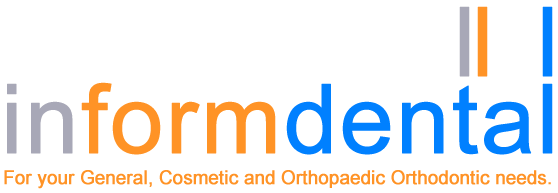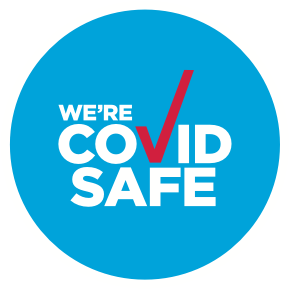SPECIALISED TREATMENTS
At Inform Dental we provide specialised dental treatments and services to our patients. These include wisdom teeth removal, snoring and sleep apnoea assessment and advice, and treatment for TMD, Temporomandibular Joint Disorder, which can cause head, neck and shoulder pain.
TMJ & BRUXISM
There’s more to oral health than teeth and gums
Talking, chewing and a thousand other every day movements can only be done because of one thing, your Temporomandibular Joint (TMJ).
Located just in front of your ears, it’s the joint that connects your jawbone to your skull and is one of the most used joints in your body.
A misaligned jaw can strain jaw and facial muscles and result in recurring headaches, face, and neck or shoulder pain. Known as Temporomandibular Joint Disorder (TMD), damage to the jaw from an accident or sporting injury, grinding teeth in sleep (Bruxism) as well as the presence of osteoarthritis or rheumatoid arthritis in the TMJ can also be contributing factors.
Grinding your teeth is called Bruxism and many people are unaware they do it, as it mostly occurs during sleep. Bruxism places a lot of pressure on the TMJ and can also cause fillings to become loose and even fracture teeth.
To determine correct jaw alignment and eliminate TMD as being the cause of any facial or neck pain the Inform Dental team can complete a comprehensive physical examination and oral health assessment. This may also involve taking detailed x-rays and a review your medical history.
There are a number of options available to treat TMD and Bruxism and alleviate discomfort.
One of the most common treatment options is a dental splint or night guard (Orthopaedic Orthotic). Made from a high grade plastic. These look similar to a sport mouthguard and fit precisely over the upper teeth or lower teeth to re-position your bite and prevent the upper and lower teeth clashing, reducing the effects of clenching or grinding your teeth. This also decompresses the jaw joints and reduces joint inflammation and reducing pain.
If you experience these symptoms, hear a clicking or popping sound when you chew or have been told you grind your teeth while sleeping, have limited mouth opening or pain when eating or moving your jaw the team at Inform Dental can assess your TMJ and offer a solution.
SNORING & SLEEP APNOEA
Snore no more
The most common way to stop a snoring partner is with a poke in the ribs or shove of the shoulders.
Although snoring is common, it can also indicate the more serious condition of Obstructive Sleep Apnoea (OSA) or sleep disordered breathing.
Obstructive Sleep Apnoea occurs when the soft tissue and muscles at the back of the throat responsible for keeping the airway open relax during sleep. This causes a blockage of the air passage and an obstruction of airflow. These non-breathing episodes can occur many times throughout the night.
The brain registers the person is not breathing, sends a signal to the throat muscles causing the snorer to jolt awake, breathe and fall back to sleep almost instantly, often with no recollection of waking.
A dental appliance may help to reposition the jaw, helping to open the air passage and make breathing during sleep easier.
For people diagnosed with severe OSA, a Continuous Positive Airway Pressure (CPAP) Machine is recommended as the most suitable treatment solution. This machine has a small air pump, a tube and facemask and is designed to pump a constant flow of low-pressure air into the throat.
If you or your partner snore or you notice they stop breathing during sleep, schedule a consultation appointment with the Inform Dental team. We can organise a home sleep study to assess for the presence of sleep disordered breathing and discuss the treatment options if necessary.
Depending on your personal circumstances you may be referred to a sleep specialist.
NEUROMUSCULAR DENTISTRY
Looking beyond your smile
Dentistry has been traditionally divided into three different categories; preventive, cosmetic and restorative dentistry.
Here at Inform Dental we go one-step further and offer a more comprehensive approach to your care. With state-of-the-art diagnostic and therapeutic services, we can treat you with a complete understanding of your oral health situation.
Traditional dentistry typically treats one tooth or problem at a time, but with Neuromuscular Dentistry, we assess the entire system of your teeth, jaw, facial and neck joints and muscles to assure they are working in harmony.
If these strictures are not aligned you may experience painful symptoms like jaw, head, neck and backaches. Neuromuscular Dentistry addresses the causes not just the symptoms.
Pain in the Jaw, Head, Neck and back can be related to many causes, a complete assessment of your symptoms / pain must be undertaken. Options of treatment would be discussed with you at Inform Dental, these may include physical therapy, ENT, Sleep assessment, as well as possible Dental Orthotics.
Our goal is to help you achieve a lasting state of health and wellness by treating your concerns as a whole.
OROFACIAL PAIN & HEADACHES
Is your jaw giving you a headache?
Of all your joints, your jaw – Temporomandibular Joint (TMJ), is one of the most used every day. It enables you to talk, yawn, chew and do a thousand other movements. It’s located just in front of your ears and connects your jawbone to your skull.
A misaligned jaw can strain your facial muscles and result in recurring headaches, face, neck and shoulder pain. Medically this is known as Temporomandibular Joint Disorder (TMD). Damage to the jaw from an accident or sporting injury as well as the presence of osteoarthritis or rheumatoid arthritis in the TMJ can also be contributing factors.
To determine correct jaw alignment and eliminate TMD as being the cause of pain or discomfort, the Inform Dental team can conduct a comprehensive physical examination. This may also involve taking x-rays and reviewing your medical history.
One of the most common and very effective treatment solutions is a dental splint or night guard. Made from a high grade plastic, it looks similar to a sport mouth guard and fits precisely over the teeth. It is designed to re-position your bite to prevent the upper and lower teeth from coming together, reducing the effects of clenching or grinding your teeth.
If you experience these symptoms, hear a clicking or popping sound when you chew or have been told you grind your teeth while sleeping, the team at Inform Dental can assess your TMJ and offer a solution.
OROFACIAL MYOLOGY
What is Orofacial Myology?
Correct function of oral and facial muscles is paramount for facial development including jaw shape, tooth alignment and function.
Orofacial myology is the science of restoring normal and mutual interaction of the muscles of the face and mouth, teeth (dentition) and respiration that is the physiological basis of speaking, chewing and swallowing. It’s a program designed to correct orofacial muscle dysfunction and abnormal swallowing patterns.
Orofacial Myofunctional Disorders are any pattern involving oral and/or orofacial muscles that interfere with normal growth, development and function.
What Can Lead to an Orofacial Myofunctional Disorder?
In most cases it is the result of a combination of factors, and may result from any of the following:
Improper oral habits, such as thumb or finger sucking, dummy, blanket, or other toys associated with the habit
Orofacial habits such as nail biting, cheek and lip biting, clothes chewing and grinding of teeth
Restricted airway, which can be due to enlarged tonsils or adenoids, a narrow or vaulted palate, a large tongue, an oversized uvula and/or allergies
Structural or physiological abnormalities such as a restrictive lingual frenum (tongue-tie)
Neurological or developmental abnormalities
Hereditary predisposition to some of the above factors.
These disorders can result in:
Tongue thrusting (abnormal swallowing pattern)
Incorrect tongue rest position
Crooked teeth
Crowded mouths
Mouth breathing
Poor posture
Incorrect mastication (chewing) function
Altered speech patterns
Asymmetrical lip appearance and function
Asymmetrical facial appearance and function
Tongue Thrust involves the thrust of the tongue against or through the teeth during swallowing. An incorrect position of the tongue during the act of swallowing and/or incorrect resting position can contribute to irregular facial development resulting in the malalignment of teeth and other medical problems. A deviated swallow follows with a “duck-neck swallow” action. This repeated action constantly destabilises the neck.
Sucking (thumb, finger, dummy) or biting habits (nails, lips) can create the same type of malalignment. What many parents do not realise is this behaviour can continue well into adulthood causing social problems as well.
These conditions can assist in creating an open mouth, lips apart in the resting posture. This is often referred to as lip incompetence and can detract from a pleasing facial appearance. It can also be seen in children with compromised airways.
Orofacial Myologists
Orofacial Myologists evaluate and treat patients with many orofacial dysfunctions or anomalies, correcting poor muscle function of the lips, tongue, face and neck.
The goal of Orofacial Myology is to assist in the creation, restoration and maintenance of a normal and harmonious musculature environment.
Therapy
Orofacial myofunctional therapy may be recommended for a variety of functional or cosmetic reasons. The therapy program is designed to retrain muscular function and to aid in the creation and maintenance of a healthy, adaptive orofacial environment. It can also help in the retention of the dental and/or orthodontic treatment, enhance appearance and can help maintain optimum dental health for a lifetime of benefits.
Orofacial Myology Therapy Program
All muscles respond better to regular and consistent exercise. Orofacial myology is therapy that deals with changing behaviour and muscle habits formed over a lifetime. The therapy consists of exercises performed for five minutes, two to three times a day. Appointments are scheduled every two weeks where a proficiency assessment is completed. With cooperation and commitment a typical course of treatment takes approximately eight visits for children. A longer course of treatment can be required for adults depending on their symptoms and conditions.
Orofacial Myology Programs Available
Tongue Thrust (deviated swallowing pattern)
Thumb, finger and dummy sucking
Biting habits (nails, lips, cheeks)
Open mouth rest position (incompetent lips)-mouth breathing
Tongue-tie (frenum)
Asymmetrical lip appearance and movement
Asymmetrical facial appearance and movement
Aging face.
PINHOLE GUM REJUVENATION
Get that smile back
This technique is used to correct gum recession in eligible patients. Through a small hole made in the gum with a needle, specially designed instruments are used to loosen gum tissue and gently move it up over the receded part of the tooth. There is no stitching or cutting and therefore postoperative pain, swelling and bruising is usually minimal. Patients are usually able to resume light normal daily activity 24-48 after procedure (this excludes strenuous activity and working out). Patients are pleasantly surprised by the instant cosmetic result!
TONGUE & LIP TIE
Get back to a normal mobility
Tongue or lip tie occurs when the frenulum that attaches the underside of our tongue to the floor of our mouth or the inside of our lip to the gum, is tight and restrictive. This can result in poor mobility of the tongue or lip and cause problems with correct dentofacial growth, digestion, speech, breastfeeding, eating and drinking amongst other things. At Inform Dental, we will do a full functional assessment to determine how your tongue or lip tie may be affecting these things and if it may need to be released. We use a Waterlase laser to perform the procedure with minimal patient discomfort.

